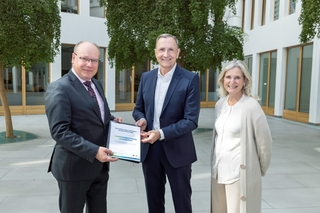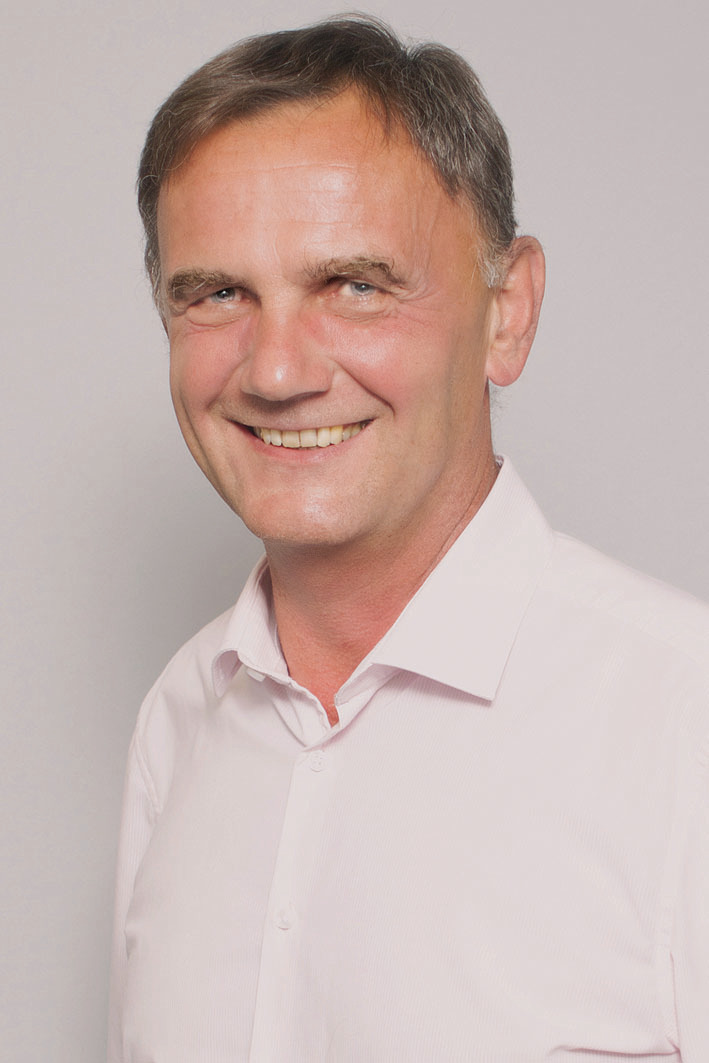EU Net-Zero Industry Act: First German project comes from Holcim Germany
08.09.2025
 State Secretary Frank Wetzel, Federal Ministry for Economic Affairs and Energy (BMWE), Matthias von der Brelje, Managing Director of Holcim Germany, and Kerstin Jorna, Director-General for Internal Market, Industry, Entrepreneurship and SMEs (DG GROW), European Commission (from left to right)
State Secretary Frank Wetzel, Federal Ministry for Economic Affairs and Energy (BMWE), Matthias von der Brelje, Managing Director of Holcim Germany, and Kerstin Jorna, Director-General for Internal Market, Industry, Entrepreneurship and SMEs (DG GROW), European Commission (from left to right)
Figure: Holcim
The European Union has selected Holcim Germany's ‘Carbon2Business’ (C2B) project as the first of a total of three strategic projects from Germany for the NZIA listing. As part of the project, Holcim Germany will operate one of the world's first climate-neutral cement plants in Lägerdorf, Schleswig-Holstein, by the end of the decade. Here, carbon dioxide (CO₂) will be processed to a high degree of purity and made industrially usable as a valuable raw material. With the Net-Zero Industry Act (NZIA), the European Union (EU) has created a legal framework to strengthen the competitiveness of European industry.
One of the world's first climate-neutral cement plants
One of the world's first climate-neutral cement plants is currently being built in Lägerdorf, Schleswig-Holstein, and is scheduled to go into operation by the end of the decade. As part of the overall project, which Holcim is implementing together with technology and infrastructure partners such as Linde Engineering and Open Grid Europe (OGE), the cement plant in Lägerdorf is expected to capture around 1.2 million tonnes of CO₂ annually and process it for further downstream use. This is made possible by the proximity to the Elbe port in Brunsbüttel, from where the CO₂ will be transported to other industries as a raw material (‘carbon capture and utilisation’, CCU) or as a temporary solution for offshore storage (‘carbon capture and storage’, CCS). A 30-kilometre-long pipeline is planned to transport the CO₂ from Lägerdorf to Brunsbüttel. Highly purified CO₂ can, for example, help replace fossil raw materials in the chemical industry. This promotes the circular economy and drives decarbonisation forward. Holcim Germany is investing a mid-three-digit million euro amount in the climate-neutral cement plant. The EU is supporting the project with around 110 million euros.
Important impetus for strengthening transformation technologies
"Congratulations to Carbon2Business Lägerdorf on being named a strategic project of the EU Net-Zero Industry Act. A showcase project for how decarbonisation promotes competitiveness and turns Europe's net-zero target into a global competitive advantage," says Kerstin Jorna, Director-General for Internal Market, Industry, Entrepreneurship and SMEs at the European Union (DG GROW).
State Secretary at the Federal Ministry for Economic Affairs and Energy Frank Wetzel: "With the Net-Zero Industry Act, Europe has provided important impetus for strengthening transformation technologies and industrial decarbonisation – and Germany is moving forward with determination. Technologies for CO₂ capture, storage and utilisation are a key factor in keeping our industrial location fit for the future.
I am delighted that the “Carbon2Business” project is the first German strategic project under the NZIA to be pioneered here in Europe.‘ Joschka Knuth, State Secretary in the Ministry for Energy Transition, Climate Protection, Environment and Nature of the State of Schleswig-Holstein: ’The EU is right to recognise the Holcim cement plant in Lägerdorf as a particularly strategic showcase project.
What we need now is a clear political commitment from the federal government that the transformation will continue. This will create planning security for similar projects in industry, enabling Schleswig-Holstein to become the first climate-neutral industrial state by 2040."
Julia Carstens, State Secretary in the Ministry of Economic Affairs, Transport, Labour, Technology and Tourism of the State of Schleswig-Holstein: "We want to make Schleswig-Holstein a climate-neutral industrial state by 2040, and decarbonisation projects such as Holcim's play an important role in this. It is clear that this requires pioneers who are willing to test new technologies and innovative business models. We are proud that Carbon2Business is a pioneering project in Schleswig-Holstein that has been recognised as the first strategic project under the EU's Net-Zero Industry Act. This project can show how we can continue on the path to climate neutrality in an economically viable way. We support that!"
‘Carbon2Business is a prime example of cross-sector cooperation,’ says Matthias von der Brelje, Managing Director of Holcim Germany. ‘Here, representatives from various industries are demonstrating their willingness to publicly commit to the Net-Zero Industry Act and actively advocate for climate neutrality. We are very pleased to be doing pioneering work with this project and to be part of the NZIA initiative.’
For more information about the project, visit: https://carbon2business.com/
CONTACT
Holcim (Deutschland) GmbH
Troplowitzstraße 5
22529 Hamburg /Germany
+49 40 3 60 02 0



